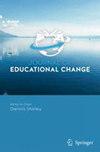Teachers’ perceived opportunity to contribute to school culture transformation
IF 2.5
2区 教育学
Q1 EDUCATION & EDUCATIONAL RESEARCH
引用次数: 0
Abstract
Abstract Teachers’ active role in school development has been recognized as important in school culture transformation. Leadership practices, such as distributed leadership and organizational support, aim to engage teachers and foster their participation and contribution opportunities. However, studies have shown that teachers’ earlier experiences and beliefs shape their participation activities. To facilitate school culture transformation and the development of pedagogical practices, it is important to understand how teachers position themselves as school developers. This interview study aims to explore what kinds of views teachers express regarding school development work and teacher collaboration, along with how these views influence their perceived opportunity to contribute to school culture transformation. Altogether, 35 teachers from three schools in Helsinki, Finland, were interviewed. The analysis revealed five teacher profiles and, thus, five different ways of approaching school culture transformation: (1) Visioner , (2) Responsibility Bearer , (3) Participating Observer , (4) Traditionalist , and (5) Stressed Withdrawer . Teachers’ orientation to school development work and received organizational support influenced teachers’ perceived contribution opportunities. Furthermore, the identified profiles experienced the needed organizational support for school development work differently; for some, it was mainly common time for collaboration, while for others, it meant reorganized structures. The results indicate that diverse support is needed to engage the whole teacher community in school culture transformation and that school leaders need to pay attention to how the distributed leadership model benefits all teachers, not just the visionary ones.

教师对促进学校文化转型的感知机会
教师在学校发展中的积极作用已被公认为学校文化转型的重要内容。领导实践,如分布式领导和组织支持,旨在吸引教师,促进他们的参与和贡献机会。然而,研究表明,教师的早期经历和信念塑造了他们的参与活动。为了促进学校文化转型和教学实践的发展,了解教师如何将自己定位为学校的发展者是很重要的。本访谈研究旨在探讨教师对学校发展工作和教师合作的看法,以及这些观点如何影响他们对学校文化转型做出贡献的感知机会。共有来自芬兰赫尔辛基三所学校的35名教师接受了采访。通过分析,我们发现了五种不同的教师形象,以及五种不同的学校文化转型方式:(1)观视者,(2)责任承担者,(3)参与观察者,(4)传统主义者,(5)强调退缩者。教师对学校发展工作的取向和获得的组织支持影响教师对贡献机会的感知。此外,已确定的档案经历了学校发展工作所需的组织支持的不同;对一些人来说,这主要是合作的时间,而对另一些人来说,这意味着重组结构。结果表明,要让整个教师群体参与到学校文化转型中来,需要多种支持,学校领导需要关注分布式领导模式如何使所有教师受益,而不仅仅是有远见的教师。
本文章由计算机程序翻译,如有差异,请以英文原文为准。
求助全文
约1分钟内获得全文
求助全文
来源期刊

Journal of Educational Change
EDUCATION & EDUCATIONAL RESEARCH-
CiteScore
5.80
自引率
7.10%
发文量
23
期刊介绍:
The Journal of Educational Change is an international, professionally refereed, state-of-the-art scholarly journal, reflecting the most important ideas and evidence of educational change. The journal brings together some of the most influential thinkers and writers as well as emerging scholars on educational change. It deals with issues like educational innovation, reform and restructuring, school improvement and effectiveness, culture-building, inspection, school-review, and change management. It examines why some people resist change and what their resistance means. It looks at how men and women, older teachers and younger teachers, students, parents and others experience change differently. It looks at the positive aspects of change but does not hesitate to raise uncomfortable questions about many aspects of educational change either. It looks critically and controversially at the social, economic, cultural and political forces that are driving educational change. The Journal of Educational Change welcomes and supports contributions from a range of disciplines, including history, psychology, political science, sociology, anthropology, philosophy and administrative and organizational theory, and from a broad spectrum of methodologies including quantitative and qualitative approaches, documentary study, action research and conceptual development. School leaders, system administrators, teacher leaders, consultants, facilitators, educational researchers, staff developers and change agents of all kinds will find this journal an indispensable resource for guiding them to both classic and cutting-edge understandings of educational change. No other journal provides such comprehensive coverage of the field of educational change.
 求助内容:
求助内容: 应助结果提醒方式:
应助结果提醒方式:


